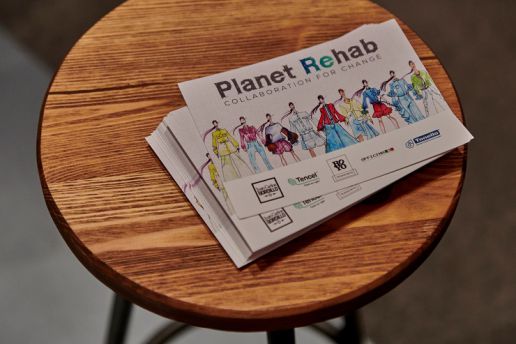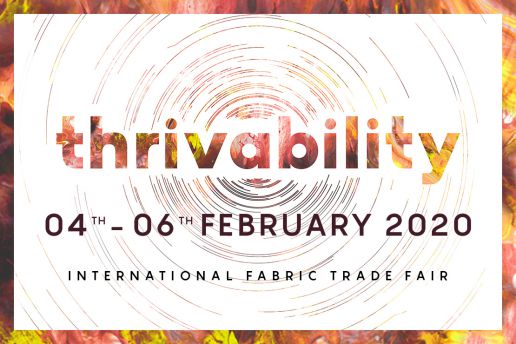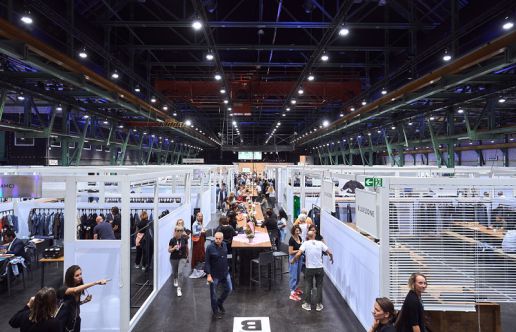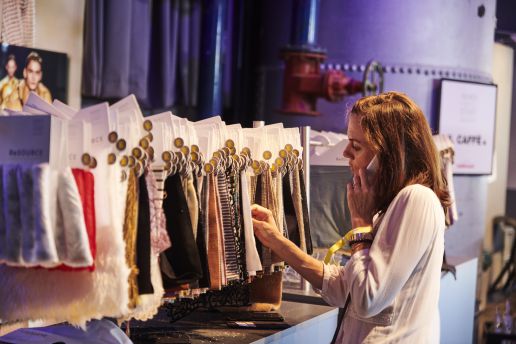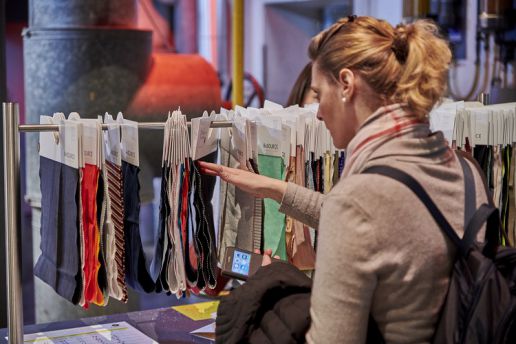Sustainability
MUNICH FABRIC START – A Paradigm Shift Towards Holistic Sustainability
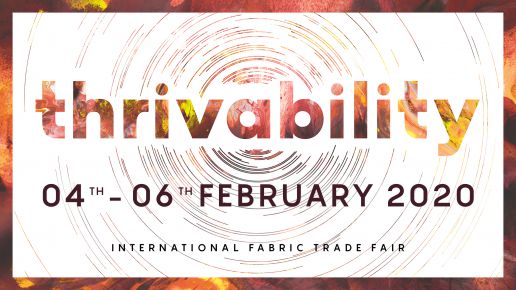
A new level of sustainability, digitalisation, transparency, a growing need for information and the desire to inspire
– that’s what the Spring.Summer 21 season stands for.
The awareness of a new ecology has become one of the strongest social movements. It challenges us to rethink, to take responsibility, to create transparency and to enter into an intensive dialogue.
The MUNICH FABRIC START with BLUEZONE, KEYHOUSE and the individual showcases presented by around 1,000 international suppliers of fabrics and additionals will introduce the Spring.Summer 21 season from 4 – 6 February in Munich. Approximately 20,000 trade visitors will have access to an extensive range of fabrics, additionals, designs, manufacturing services, supported by an informative and inspiring events programme.
The Spring.Summer 21 season is characterised by dynamism, waves and radiance – the guiding theme THRIVABILITY brings enthusiasm, creates excitement, let’s blossom and flourish. THRIVABILITY deconstructs our understanding of fashion and embeds a new, positive way of thinking: aesthetics and people see eye to eye; resources and nature are respected. This creates a new understanding of holistic sustainability and future-oriented entrepreneurial spirit. Spring.Summer 21 answers current market needs and reflects an evolved understanding of values. Knowledge, transparency, quality, responsibility and communication influence the current showcase of innovative product and processes on offer. THRIVABILITY combines the essence of this new era with a classic definition of trends and cultivates an inspiring and progressive direction for materials, fashion and design.


MUNICH FABRIC START HIGHLIGHTS
ASK THE EXPERT – Communication islands with THRIVABILITY experts.
Taking into account the focus on sustainability and innovation driven by THRIVABILITY, a new information concept will be integrated into the Trend Forum at the upcoming MUNICH FABRIC START. At various communication islands in the foyer of the MOC, industry experts will provide impulses and answers to current questions, from the origins of the material to exploring the diverse range of production processes and end garment recycling. Through direct discussions, you will gain valuable know-how, insights into topics and current solutions for both sustainable and innovative processes along the value chain:
CIRCULARITY | FIBERS & MATERIALS | MARKETING & COMMUNICATION | RECYCLING | SOCIAL RESPONSIBILITY
NEW ICON GUIDANCE SYSTEM
In addition, MUNICH FABRIC START has implemented a newly developed icon guidance system which in the spirit of transparency, identifies the sustainable and technical aspects of all the material highlights presented in the Trend Forums. In this way, visitors can establish these respective and previously hidden properties of textiles and ingredients at a single glance.
FABRICS
AWARENESS AS A DRIVER OF INNOVATION. Around 700 suppliers present their creative new developments across more than 1,000 collections – based on the latest technology innovations and the conscious and conservative use of resources. The fashionable combination of natural and innovative fibres is reflected in numerous new textile qualities including: luminous surfaces, wet gloss looks, soft glazes, colour gradients, transparent qualities, abstract patterns and relief elements. This season, MUNICH FABRIC START once again unites textile producers with a huge range of state-of-the-art fabrics, presenting not only essentials such as cotton, viscose, wool, elastane, lace and linen, but also novelties such as super-stretch silk, recycled polyester, Ecovero-Tencel linen, Naia and Cupro fibre blends or hemp textiles.
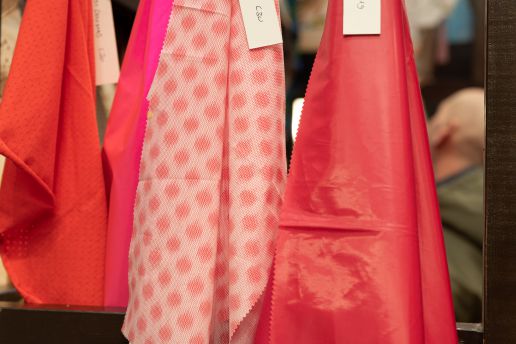
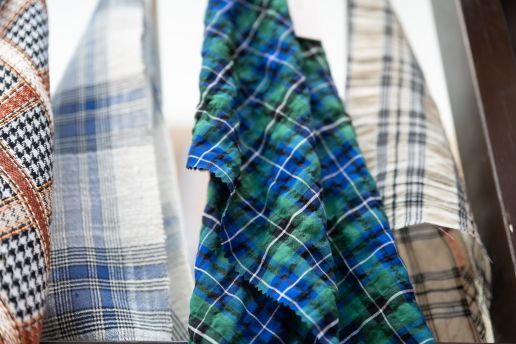
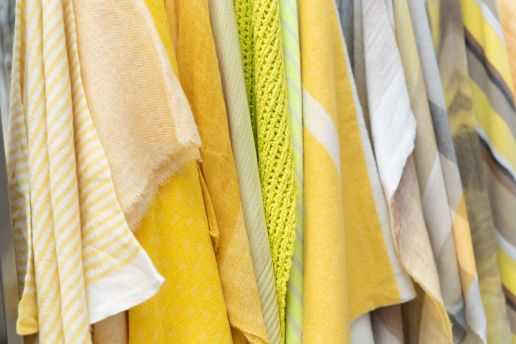
ADDITIONALS
TRIMS FOR FUTURE – this is the global motto which represents approximately 200 of the world’s leading international ADDITIONALS suppliers. Fashionable new developments revolve around iridescent surfaces, glowing yarns and electrifying colour applications. The focus is on recycled and sustainably produced products in natural colours. ITL Group will not only show its comprehensive range of products for the first time, but will also launch its C.A.R.E. Collection (Conscious, Affordable, Responsible, Eco-friendly labels) during the upcoming trade fair. Clic sums up these developments: “We have focused on realistic and organic articles that preserve nature both in form and texture”.
ReSOURCE
In a comprehensive forum, the ReSOURCE Area categorises and presents around 800 sustainably produced articles by exhibiting fabrics and additionals producers. “With our ground breaking DryIndigo® technology it is now possible to produce denim with 0% water consumption”, Tejidos Royo describes its latest milestone. Bornemann Etiketten sees the biggest challenge in balancing creativity, sustainability and efficiency, while Dutel focuses on timeless and durable top quality. Lanificio Roma pursues resource saving process solutions with the aim of wasting less and reusing production and consumption waste as new resources.
DESIGN STUDIOS
Natural colours based on sustainable dyeing techniques now determines the colour palettes of the inspiring designs at the internationally renowned, textile designers and trend offices in the DESIGN STUDIOS. The current change in the textile industry is leading to a revolution in the printing and dyeing industry and inspires a revival of natural dyes. Design Union and Primus Pattern also emphasize the simultaneous closeness to nature and diversity of textile prints for Spring.Summer 21.
SOURCING
Ready-made solutions are becoming more and more important and the interest in sourcing providers close to the market is also growing with a focus is on speed and a reduction in complexity. As globally established manufacturing companies in the SOURCING Area, numerous high-quality newcomers such as Easy Invest Solutions or Union 3 Fashion offer comprehensive insights into the entire textile production chain and its reliable procurement management. For Spring.Summer 21, Cascade Enterprises takes its inspiration from nature and returns to the basics in prints, fabrics and silhouettes. Sourcing specialist Fateks Kumas Tekstil offers and processes fabrics made from recycled PET bottles, also to conserve resources.
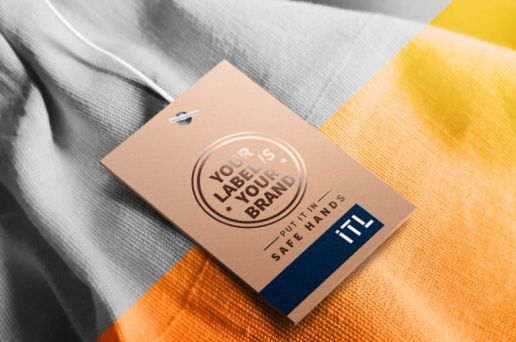
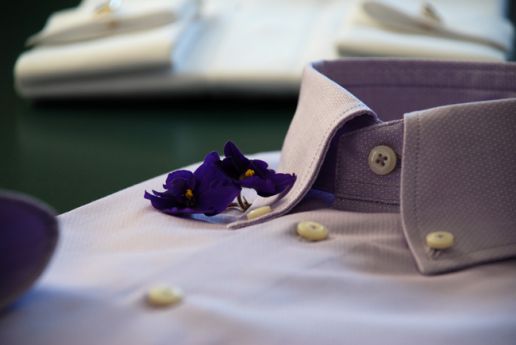
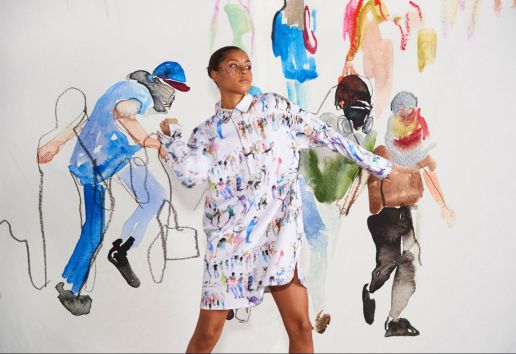
As the think tank for innovation, KEYHOUSE provides insights into future fabrics, new technologies, smart products & processes, sustainable innovations and alternative material resources, offering and inspiring pioneering concepts. For more information click here.
With over 100 major international brands, BLUEZONE has positioned itself as the initiator of an extraordinary, strong and innovative denim community. The answer to a conscious consumer approach and a growing interest in ready-made solutions that offer revolutionary products, state-of-the-art technological processes and complex functionalities. For more information click here.
KEYNOTES & SEMINARS
At the upcoming MUNICH FABRIC START, there will be a premium event programme featuring impressive panel discussions, polarising keynotes and trend seminars by international experts. The KEYHOUSE in Hall 5 will feature exciting lectures on the various subjects of innovation. The diverse events on offer in the BLUEZONE area of Hall 7 will provide an in-depth insight into the developments in the denim industry, while the ReSOURCE Forum in K3 in the MOC will offer an equally relevant programme on the topics of sustainability, certification and quality seals.
David Shah about „The 10 Design Pillars” – Tuesday, 4 Feb 2020, 10.30am – 12pm
The trend forecaster and publisher of Textile View will deliver the keynote “The 10 Design Pillars”. David Shah presents new perspectives on design influences from Slowbilisation to Hopepunk, from Biophilia to Datascapes.
Fashion Revolution – Tuesday, 4 Feb 2020, 12pm – 1pm
Ariane Piper gives an insight into Fashion Revolution – how the campaign will revolutionize the fashion industry. The viral campaign “Who made my clothes” will once again feature in the trend forums as an installation for transparency in the fashion industry.
Expert panel about „Future of the Textile Value Chain” – Tuesday, 4 Feb 2020, 2pm – 3.30pm
The panel discussion with expert participants on the subject of “Future of the Textile Value Chain” will be moderated by Jana Kern and Alex Vogt from KERN Consulting. The five international experts, including Prof. Dr. Michael Braungart, Hans H. Jung, David Shah, Jan Wilmking and Lauren Zahringer, will discuss the disruption and transformation through sustainability and networking in the textile value chain.
Rivet 50‘s 2020 Vision – Tuesday, 4 Feb 2020, 3pm – 4pm
What will the new decade bring for the denim industry and community? Rivet 50 will lead a discussion between some of the world’s most influential denim characters to discuss their predictions for business, technology and fashion.
Exclusive Trend Seminar by Li Edelkoort – Tuesday, 4 Feb 2020, 4pm – 6.30pm
Arguably the most famous trend forecaster of our time holds an exclusive trend seminar. In an impressive presentation, GREEN WAVE – the Fashion Trends for Spring.Summer 21, as GREEN BOOK – the Recreationwear Trends for Spring.Summer 21, as well as STILLNESS – a Full Colour Forecast for Autumn.Winter 21/22.
„Fashion Activism” Panel by Muchaneta Kapfunde – Wednesday, 5 Feb 2020, 11am – 12pm
FashNerd founder Muchaneta Kapfunde brings together the experts Kresse Wesling, Styliani Parascha, Marta Waydel and Marina Toeters as part of the panel discussion “Fashion Activism: Creating the Fashion of the Future.”
Hessnatur Stiftung about „The way to the green button“ – Wednesday, 05 Feb 2020, 11am – 12pm
Rolf Heimann, CEO of the Hessnatur Foundation, Institute for Applied Sustainability, explores in a lecture the question “How do I prepare my company for certification?”.
„How automation will change the fashion industry” – Wednesday, 5 Feb 2020, 2pm – 3pm
The five experts in technology, David Schmelzeisen, Ralf Schneider, Dr. Thomas Fischer, Jon Zornow and Sabine Kühnl will discuss “Don’t be afraid of robots – how automation will change the fashion industry” in a panel discussion. Automation, digitalisation and localisation are the trends that are reshaping the global fashion market. Is the fashion industry ready to adapt to new standards? What consequences does this have for the current procurement structure, also in terms of social responsibility?
“The data behind today’s winning marketing strategies” – Wednesday, 5 Feb 2020, 5pm – 6pm
Gina Gulberti, VP Digital Marketing at Launchmetrics, explains in her keynote “The data behind today’s winning marketing strategies”.
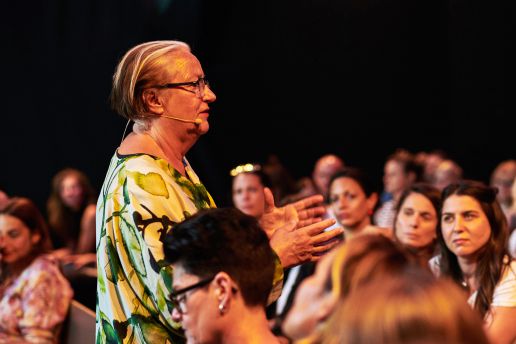
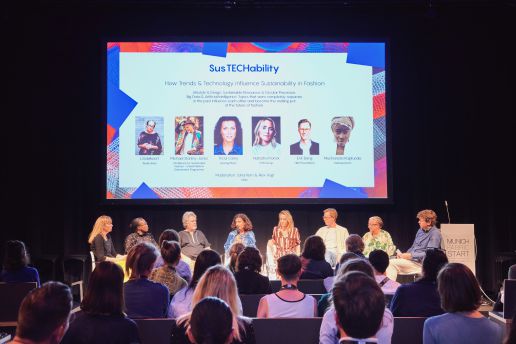
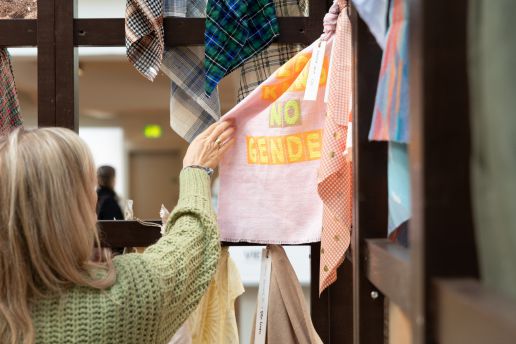
All dates and the complete events programme can be found here.
MUNICH FABRIC START & KEYHOUSE & SOURCING
04 February 2020 | 9.30am – 6.30pm
05 February 2020 | 9.30am – 6.30pm
06 February 2020 | 9.30am – 4.00pm
BLUEZONE
04 February 2020 | 9.30am – 6.30pm
05 February 2020 | 9.30am – 6.30pm
KEYHOUSE – A Strong Network of Creative Minds
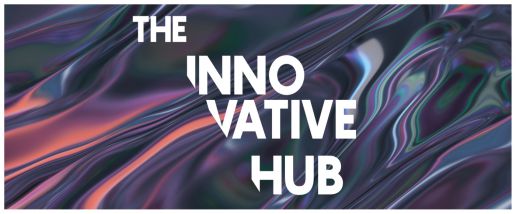
Progress and new levels of sustainability. Combining hand-made and digitalisation. The future of the textile and fashion industry is complex and challenging. The demand for greater transparency and information, for innovative solutions, new mindsets and forms of production is all the more loud and urgent.
KEYHOUSE, as the think tank of MUNICH FABRIC START, offers concrete approaches towards a visionary textile and fashion industry, providing answers, inviting discussions and interaction, showcasing new directions and definitions of innovation. In this way, an inspiring network of unique partnerships and collaborations with ambitious projects has been established.
At KEYHOUSE, everything revolves around innovation – be it the luminous jacket from MUSGO TECH, 3D printing and 3D knitting from Cocccon, the solution for a digitally networked supply chain from Lectra, or the Nebudye dyeing process using the Officina +39 nebulization system. Numerous innovative suppliers will showcase their trend defining developments for the first time at KEYHOUSE, including CLO Virtual Fashion with 3D visualisation of garments, Circular Fashion with workshops and software tools for innovative recycling management, and Recover providing accurate colour in upcycled yarns.
“Fashion must take a holistic hybrid approach in order to establish sustainable innovations in the apparel industry as a permanent feature.
These sustainability initiatives can be implemented by integrating new technologies with a high degree of design, disruption and integration.”
Muchaneta Kapfunde, Founding Editor-in-Chief FashNerd.com
HIGHLIGHTS AT KEYHOUSE
THE NUTURE ROOM WITH PAULINE VAN DONGEN. With “The Nurture Room“, Pauline van Dongen creates a space for meeting and inviting exchange among like-minded people who share the desire to redefine the fashion industry. The organised shared research sessions on topics such as workwear, outdoor clothing or casual wear etc. are led by fashion tech experts and show how technology can be sensibly embedded in clothing. Workshops will inspire participants to expand their know-how and connect companies along the entire value chain so that they can follow up with concrete action. Please find an overview of all workshops sessions here.
Due to the limited number of participants in the free workshops, we kindly ask you to register by sending an email to Chantal Gräff at cgr@munichfabricstart.com.
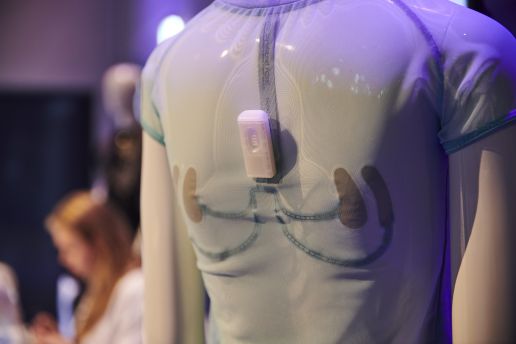
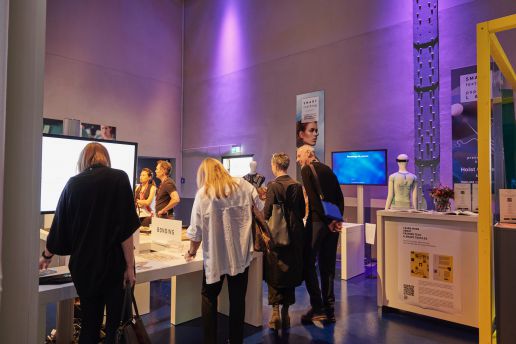
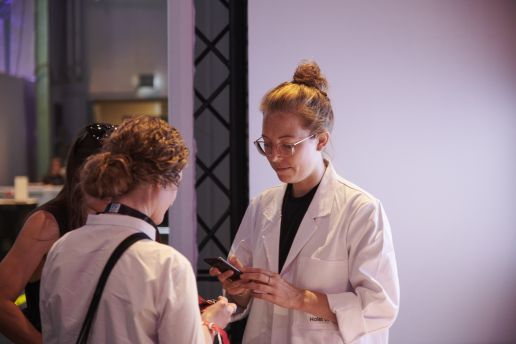
RE-FREAM PROJECT BY CARMINA FERRI. With her project Re-FREAM, Carmina Ferri, founder and CEO of Care Applications, wants to bring together designers and researchers to jointly develop innovative fashion concepts. Designers are invited to submit their proposals for ‘3D Manufacturing’, ‘Electronic & Textiles’ and ‘From Linear to Sustainable Circular Systems’. The winning innovative art concepts will then be developed in the three corresponding research centres.
The SUSTAINABLE INNOVATIONS Forum combines poetry and problem solving. It will showcase inspiring developments and establish new perspectives on the world of textiles: from extraordinary innovations, new material resources and the combination of the traditional and modern to captivating and thought provoking installations. Discover the following innovations:
- Karin Vlug und Bas Froon see the future of fashion in regional fashion production that is made to measure, on request and using digital technologies.
- CONSUMPTION OF HERITAGE. Sun Lee questions the values of consumers and producers and thus those of the conventional fashion system.
- PRINTING WITH LIGHT. Madeleine Marquardt combines new technologies with Cynatopie, one of the first photographic printing processes, thus opening up new possibilities for modern textile design.
- SEAMLINE PROJECT. Gu Qiong emphasizes the object character of clothing by highlighting seams in brightly coloured yarns.
- SISAL, MORE THAN A ROPE. Isabella Monaco uses sisal for clothing and is experimenting with hydrogen peroxide and sodium carbonate to make the natural fibre softer while maintaining its robustness.
- RINSE OFF. Caterina Tioli uses the properties of potato starch to stabilize unspun wool for processing.
- CT DAIRY. Gal Yakobvitch develops a water-repellent coating for textiles based from milk protein. The result is a sustainable unisex workwear made of vegetable-dyed second-hand T-shirts.
- FOREIGN FORAGING. Jeanette Lili Weiss poetically addresses the complex problem of scarcity and abundance in times of climate change.
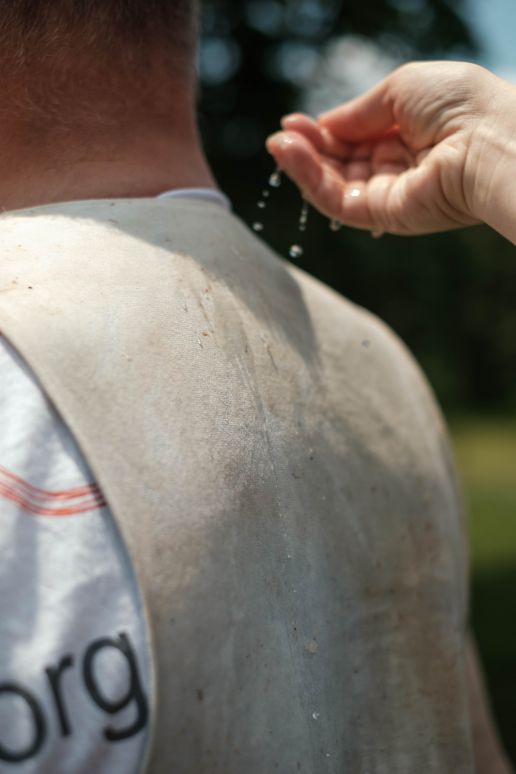
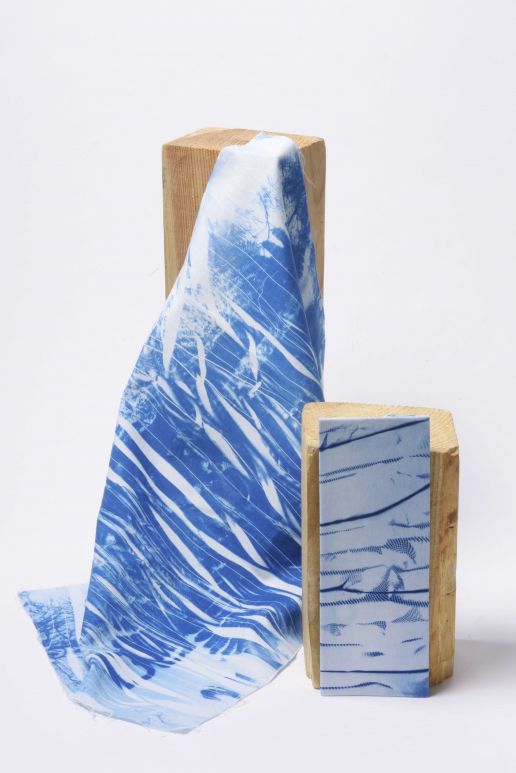
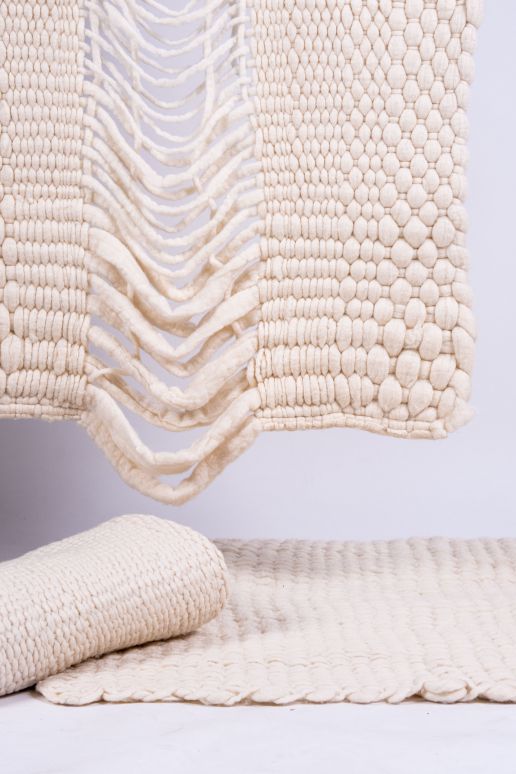
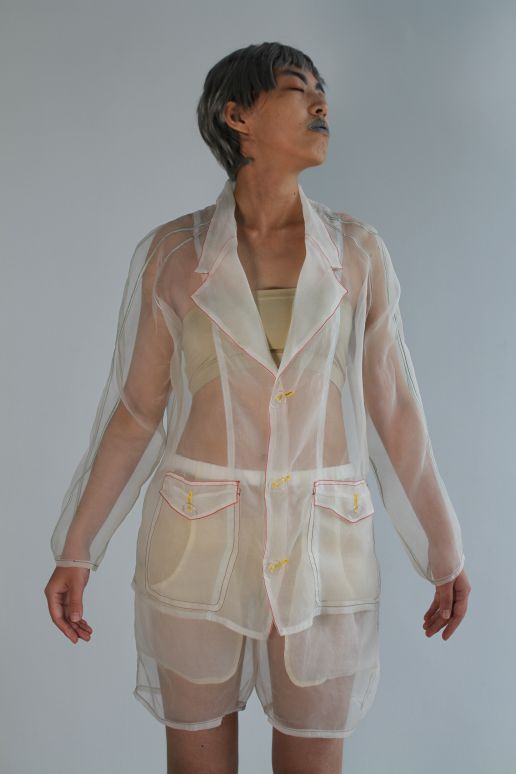
“Our goal is to take a look at the possible future with these 8 selected Sustainable Innovations, so that the industry and its professionals can reach the next level. It is an ongoing dialogue. We are a community that is growing and connecting, sharing visions and ideas – it’s a very inspiring atmosphere”.
Simon Angel, Curator Sustainable Innovations MUNICH FABRIC START
KEYNOTES & SEMINARS
KEYHOUSE also offers a comprehensive and exclusive event programme. This includes trend seminars, exclusive workshops, keynotes and round tables. You can find the complete event program here.
Exklusive Trend Seminar by Li Edelkoort – Tuesday, 4 Feb 2020, 4pm – 6.30pm
Arguably the most famous trend forecaster of our time holds an exclusive trend seminar. In an impressive presentation, GREEN WAVE – the Fashion Trends for Spring.Summer 21, as GREEN BOOK – the Recreationwear Trends for Spring.Summer 21, as well as STILLNESS – a Full Colour Forecast for Autumn.Winter 21/22.
David Shah about „The 10 Design Pillars” – Tuesday, 4 Feb 2020, 10.30am – 12pm
The trend forecaster and publisher of Textile View will deliver the keynote “The 10 Design Pillars”. David Shah presents new perspectives on design influences from Slowbilisation to Hopepunk, from Biophilia to Datascapes.
„Fashion Activism” Panel by Muchaneta Kapfunde – Wednesday, 5 Feb 2020, 11am – 12pm
FashNerd founder Muchaneta Kapfunde brings together the experts Kresse Wesling, Styliani Parascha, Marta Waydel and Marina Toeters as part of the panel discussion “Fashion Activism: Creating the Fashion of the Future.”
“United Nations SDG’s Agenda 2030: Challenges & Opportunities for the textile industry” – Wednesday, 05 Feb 2020, 1pm – 2pm
In 2015, the UNGC formulated 17 goals for the sustainable development of our planet and on this basis the “Agenda 2030” of the United Nations was created. Daniel Pinto, Business Director of Scoop, will refer in his presentation to the challenges and opportunities for the textile industry and explain how existing technologies and innovations in the industry can be used to achieve the set goals.
„How automation will change the fashion industry” – Wednesday, 5 Feb 2020, 2pm – 3pm
Five experts in technology, David Schmelzeisen, Ralf Schneider, Dr. Thomas Fischer, Jon Zornow and Sabine Kühnl will discuss “Don’t be afraid of robots – how automation will change the fashion industry” in a panel discussion. Automation, digitalisation and localisation are the trends that are reshaping the global fashion market. Is the fashion industry ready to adapt to new standards? What consequences does this have for the current procurement structure, also in terms of social responsibility?
“The data behind today’s winning marketing strategies” – Wednesday, 5 Feb 2020, 5pm – 6pm
Gina Gulberti, VP Digital Marketing at Launchmetrics, explains in her keynote “The data behind today’s winning marketing strategies”.
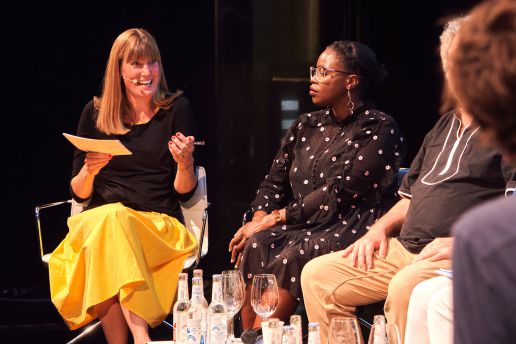
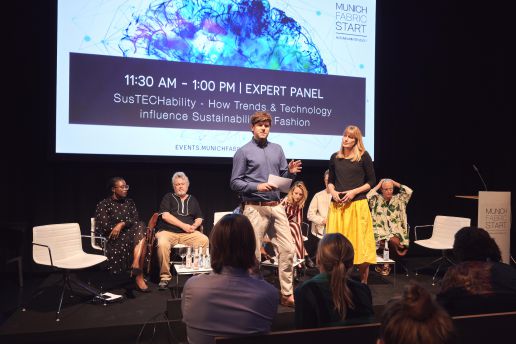
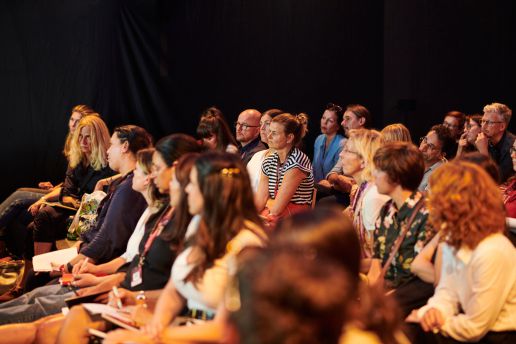
All dates and the complete lecture programme can be found here.
MUNICH FABRIC START & KEYHOUSE & SOURCING
04 February 2020 | 9.30am – 6.30pm
05 February 2020 | 9.30am – 6.30pm
06 February 2020 | 9.30am – 4.00pm
BLUEZONE
04 February 2020 | 9.30am – 6.30pm
05 February 2020 | 9.30am – 6.30pm
Hardwear: The Sustainable Denim Wardrobe
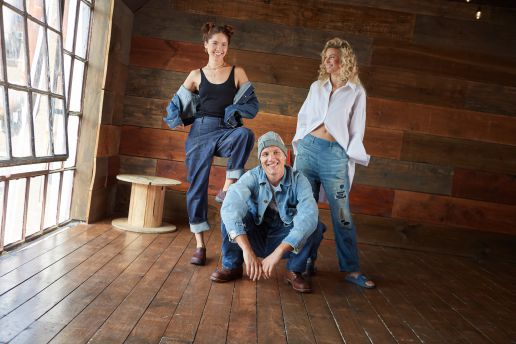
‘Hardwear’ The Sustainable Denim Wardrobe is the collaborative project between TENCEL™ X JEANOLOGIA® X ENDRIME®, made at BLACKHORSE LANE ATELIERS. This garment collection is the result of a unique project, whose focus was to create a true workwear wardrobe based on TENCEL™ Denim fabrics.
The TENCEL™ Denim Team and Jeanologia® Brainbox Team have worked in partnership on many previous projects. Following their attendance at a Denim History lecture at BLUEZONE by MUNICH FABRIC START, they were inspired to connect with the presenter to discuss the possibility of a collaboration. Following a subsequent visit to husband and wife team, Mohsin Sajid and Sadia Rafique from ENDRIME®, in their West Sussex design studio, the ‘Hardwear’ concept was born. Mohsin has garnered a solid reputation as a modern vintage denim designer, while Sadia has expertise in art direction and graphic design.
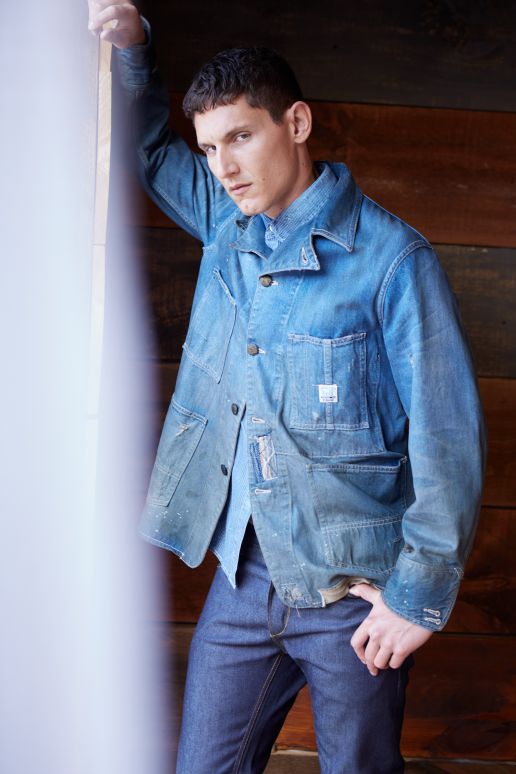
The brief was to design an authentic workwear collection, inspired by vintage garments from the ENDRIME® archive, using only the latest commercial TENCEL™ Lyocell fabrics, complimented by the application of the latest laundry technologies from Jeanologia®.
“This collection was a real challenge for us, but it was also great fun as we reached back into our own vintage collections and were able to apply all the learning that we amassed from our “Truth & Light” collections”, says Jeanologia® Brain Box Creative Director, Carme Santacruz Zaragozá.
Eight fabric mills were chosen to collaborate, A&A Textiles, Atlantic Mills, Blue Diamond, Kaihara, KG Denim, Orta Anadolu, Stella Blue and, last but not least Candiani, who agreed to supply their 2019 ITMA Sustainable Innovation award winning fabric which is a 50/50% blend of TENCEL™ x REFIBRA™ Lyocell and recycled cotton.
“This project was a real departure for us, because this denim category has historically been the domain of 100% cotton. We wanted to challenge that model and we did so by going to partners who are recognised for their expertise in this area” says Michael Kininmonth, Global Denim Development Manager for the Lenzing Group. “As always, we aim to work with what we believe are some of the best sustainably produced denim fabrics available in today’s market that combine the latest advancements in fibre and finish”.
The prototypes were pattern-cut and made-up at the ENDRIME® studio, using vintage machinery. Every detail was well considered and used iconic details from garments that dated from as early as the 1870s through to the 1940s. YKK manufactured and supplied custom designed period-correct inspired Carved in Blue buttons, with washer and burr rivets made in their most eco finishes. The prototypes were then reproduced at Blackhorse Lane Ateliers in East London, a maker of ready-to-wear selvedge & organic raw denim jeans renowned for their quality, community and eco-consciousness.
“Being asked to design an authentic denim collection using TENCEL™ Lyocell has been a dream project for Sadia and I. It has been a joy for us to create and has been a true collaborative project, it’s been a career highlight”, concluded Mohsin Sajid.
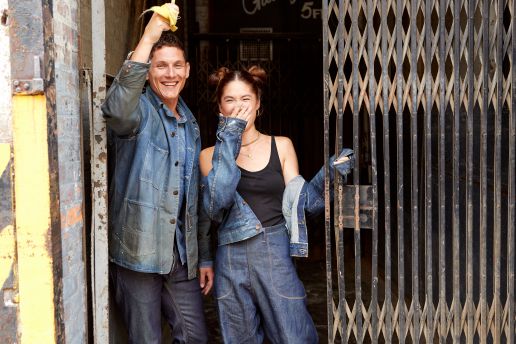
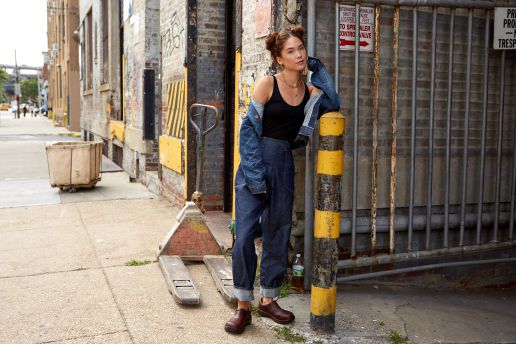
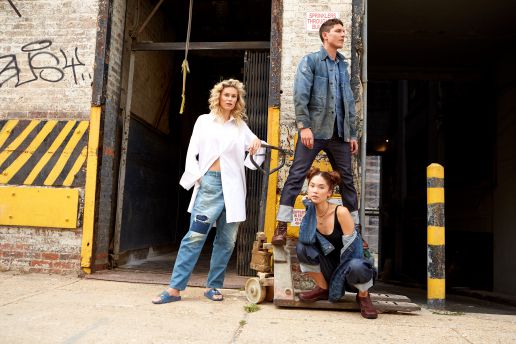
For more information about the HARDWEAR capsule collection from the Sustainable Denim Wardrobe, contact denim@lenzing.com
Yünsa: Pioneers in Combining Sustainability and Digitalisation
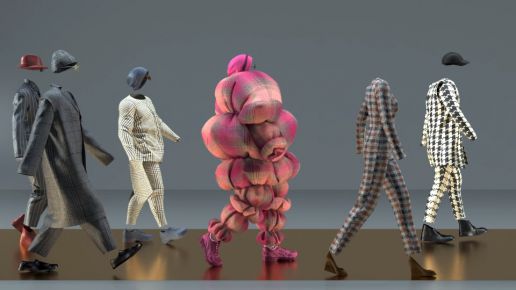
Brands, suppliers and retailers evaluate to digitize their value chain to reduce time in product development, gain cost efficiency and increase their eco-consciousness. Those brands and suppliers who prevent a digital option gain a significant competitive advantage over those that remain static.
We interviewed YÜNSA, as pioneers in the combination of sustainability and digitalization, they will offer a 100% digitalized collection in Spring.Summer 21. This and all successive collections will consist of fabric hangers for quality and hand feel reference as well as digital design and colour cards which are constructed and visualized in Penelope. Improvements in product development are expected to be up to 40% in terms of speed, cost and sustainability.
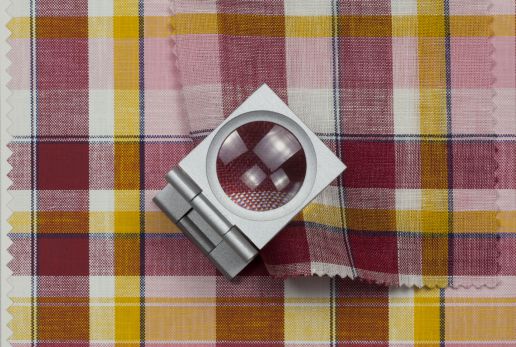
Digitisation goes hand in hand with sustainability, how are the digital connection tools used alongside the value chain to ensure sustainability?
Sustainability is not only about the raw materials but also the production process, chemical usage, waste management as well as time and energy consumption. Conventionally, as much as 80% of blankets and sample fabrics produced for either collections or customer requests were wasted and could not be used. If there are any mistakes in the finishing applications, fabrics need to be repaired and thus increases chemical usage and energy consumption, creating additional waste and pollution.
Digital product management is completely clean and fast. Developing a new pattern and colour variant takes less than an hour and is open to numerous corrections. With the possibility of simultaneous sharing via the cloud it does not rely on standard transportation methods which wastes time and resources. No waste, no pollution, fast and cost efficient.
What challenges have you faced throughout this process?
The biggest challenge is the resistance of the colleagues, managers and shareholders to the digital transformation. The industry and the laborers of our sector are very conservative in getting out of the traditional way of working. Financial and technical difficulties are easily overcome, as long as the team is open to change, believing in its benefits and supporting the process. We are lucky that Yünsa has an experienced, dynamic and enthusiastic team. Transformation is supported by the whole company. At this point, we should send a very special thanks to our information technologies team.
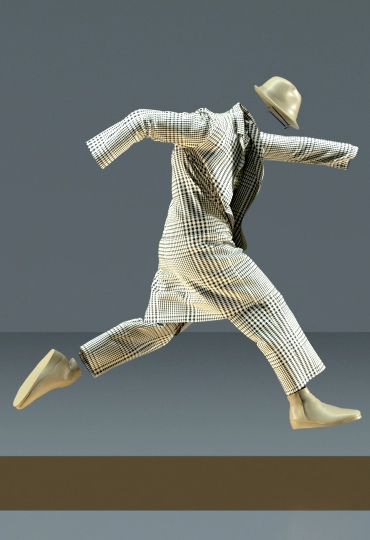
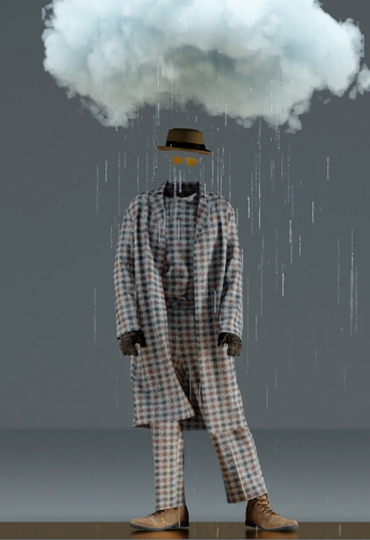
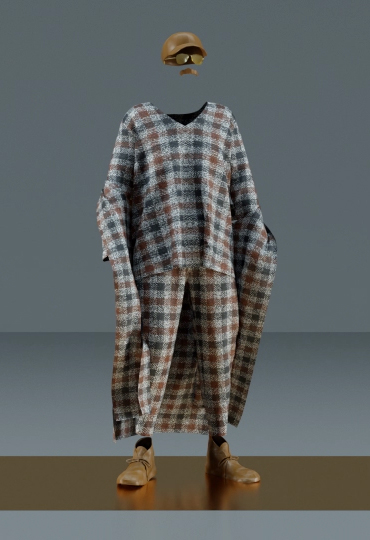
What were the initial steps of upgrading your sampling process with this new digital sampling process?
It all started with believing in digital transformation. We made the necessary technology investments in order to become pioneers in the sector, including Penelope CAD, Color Digital and ERP software. When our design team understood the benefits of digitization, they immediately took over the project.
We have digitized more than 9.000 yarn/colour combinations. This process is continuous as we create new yarns and colours every new season. For the Yünsa collections, we develop the designs and colour ways in our CAD software and create digital Yünsa collections. These collections will be available to customers in our online “Yünsa Shop” that will allow our customers and brands to browse the Yünsa collections, select and order fabrics, digital materials and make new requests.
Special customer developments are currently being developed in our CAD software and shared with customers via the cloud. The patterns are ready to be downloaded and fully integrated into the leading digital solutions such as CLO and ASSYST. For realistic simulation and digital decision making, the physical information based on measured parameters of our fabrics will also be included in the cloud library.
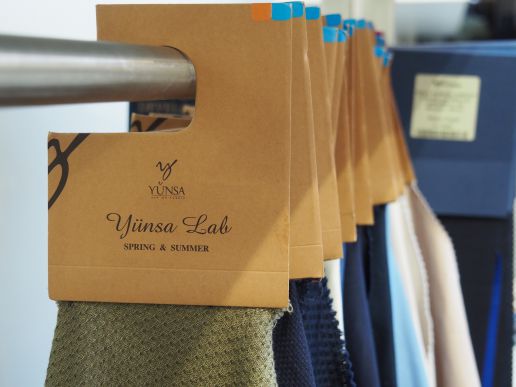
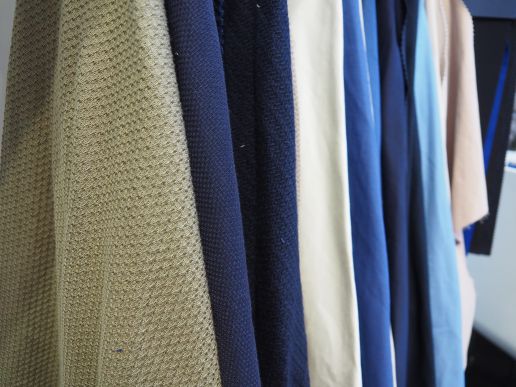
To what extent do you believe this is the future of production sampling for fashion?
Digital workflow is the real future of the fashion industry. We believe all parties of the fashion industry will experience the digital transformation in 3 to 5 years. Brands and suppliers who provide digital solutions will gain a significant competitive advantage over those that remain static.
What results have you seen in terms of cost and waste reduction?
Not much at the moment. As the majority of the industry is only at the stage of observation, alongside the digital versions we are still preparing the Yünsa collections and customer requests by traditional production means such as handlooms, blankets and sample meters, we haven’t seen a significant cost or waste reduction yet. Brands need to understand the benefits of this future workflow and start digital transformation instead of waiting others to step forward. Yünsa is ready to serve fully digital.
What are the benefits to the environment by embracing this new sampling process?
Digital workflow is clean and environmentally friendly. Expected minimum 40% sample production reduction means less dye stuff and chemical usage, less fabric waste, less energy & water consumption, less carbon release. I always use the “miraculous” expression for wool as the main raw material we use in Yünsa; natural, renewable, biodegradable, insulator, breathable, flexible, resistant and safe. Digital workflow is also miraculous; sustainable, eco-friendly, cost conscious, fast, standardized, precise.
Visit Yünsa at MUNICH FABRIC START on February 4-6 2020 in Munich, Section 1, Stand F103
BLUEZONE Driving ECOISM in the Denim Industry

Transparency, environmentally friendly production and innovative textiles: the denim industry deals with new challenges – which are faced as an optimistic international blue network.
With over 100 major international brands, the BLUEZONE has positioned itself as the initiator of an outstandingly strong and innovative denim community. Answering to a conscious consumerism approach and a growing interest for ready-made solutions, offering future-oriented products, state-of-the-art technological processes and complex functionalities.
“As we and the entire industry strive for continuous improvement, BLUEZONE presents the latest developments in the denim sector cross-seasonal. As one of the world’s leading denim shows, which has long been providing environmentally conscious solutions to the industry, BLUEZONE’s success is the result of joint efforts and a willingness to change and take new initiatives.”
Panos Sofianos, Denim Curator BLUEZONE
Reject egoism, follow ECOISM – the current BLUEZONE stands for a call for togetherness and collaboration for the good of our planet. With our ECOISM movement, we, as a blue community, show the upheavals in the industry and solutions related to climate change.
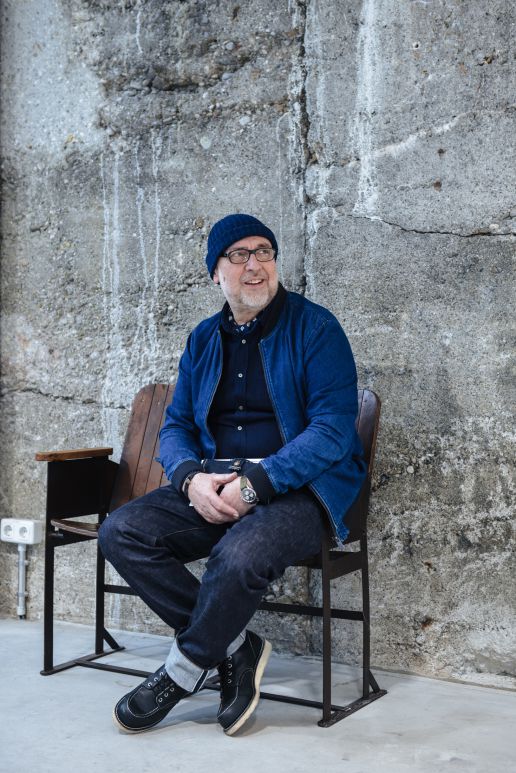
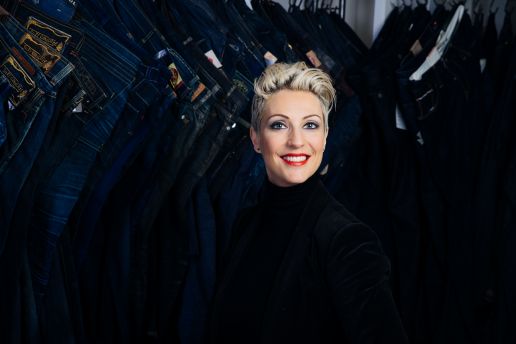
These and other relevant themes for the denim market will be deepened in numerous lectures and international panel discussions on the long wooden panel in the centre of the BLUEZONE, which offers space for direct exchange and personal dialogue.
“I deeply believe that our world needs a strong change. We cannot use all the resources our planet has given us. If our statesmen cannot show us the way for a better world, then, WE need to show them how to achieve this. By being altruistic, consuming less, and focusing on other’s wellness, rather than on our own material comfort.“
Lucie Germser, Monsieur T.
BLUEZONE: 4 – 5 February 2020
MUNICH FABRIC START: 4 – 6 February 2020
Not At All Buttoned: Relying on Nature and Sustainability
Sustainability and value are at the top of the agenda for the button manufacturers. Natural materials as well as new, recyclable materials are even more in focus. The number of certifications for ecological and sustainable products and production methods has also increased even further for the manufacturers of buttons and additionals.
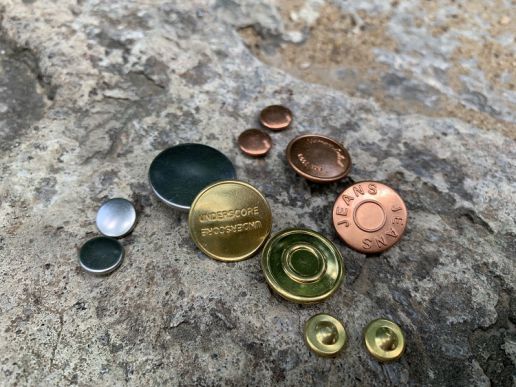
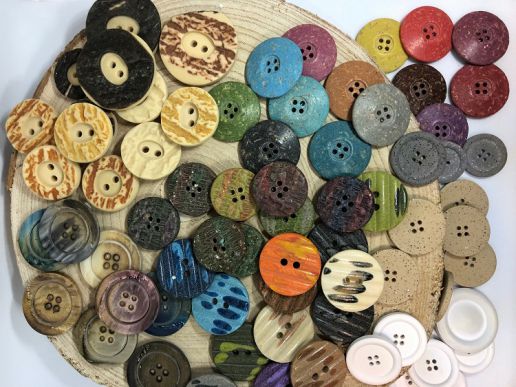
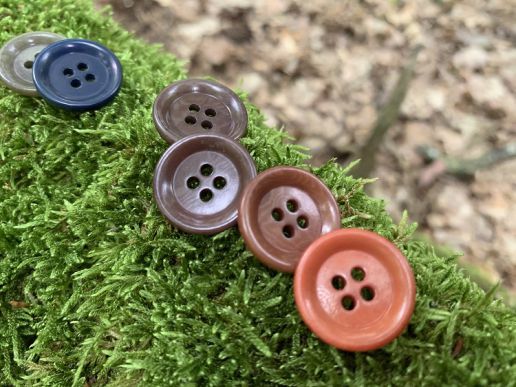
Union Knopf, for example, displays vegetable-colored walnut buttons as well as buttons and trim made from 100% Social Plastic, a material made from recycled plastic waste.
“Not more but better” – true to this motto Creativ Knopf extends the collection of high-quality natural materials. For a fashion-conscious customer who is increasingly looking for longer-lasting garments. Grades of shades of brown, colors such as spice stalls oriental markets and soft shades of gray support the tendency to soft, natural and haptic pleasant materials. Classical music is reinterpreted. Traditional designs are unexpectedly implemented and modernized.

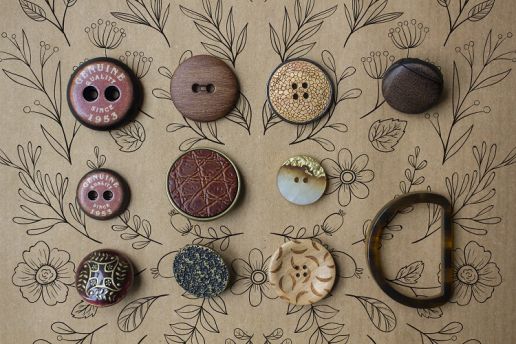
The menswear continues to be influenced by retro influences. So cultivated Easyness and modern comfort from the sportswear at Creativ Knopf dominate the trends. Both the classic and casual casual looks benefit from it. Thus, freedom is created to continue the drive of menswear. Black becomes a minimalist matter of course when combined with elegant gray shades. New shades of brown become a futuristic-feeling entity through their combination of accent colors.
Rosenfelder also pays great attention to sustainability in addition to an extensive range of buttons made of natural materials. Thanks to constant research and development in the field of high-quality plastic materials, it has been possible to replace the conventional polyester resins contained in the material with new, eco-friendly bio-based binders. Furthermore, a proportion of recyclable waste is added to these materials.
Photocredits: Knopf & Knopf, Union Knopf, Creativ Knopf, Rosenfelder
A Conversation On Sustainability, Transparency & Mainstream
From slow fashion to mainstream business, materials to education, fashion and sustainability raise so many questions. A vast and complex issue, Muchaenta Kapfunde of FashNerd turned to 3 women making a difference in the sustainable fashion space.
Charney Magri a fashion photographer turned documentary maker. The co-founder of Fashion 4 Change has worked for the likes of British Vogue and Ralph Lauren, and now she is a partner for do epic sh*t. Olivia Pinnock is a London-based fashion journalist, lecturer and founder of The Fashion Debates. She is dedicated to uncovering insightful stories in a fascinating industry and promoting positive change for a more sustainable future for it. Abigail Morris is the Founder and CEO of Compare Ethics. It is a start-up that connects you to ethical brands through the latest online and offline experiences. Since launching in 2018, Compare Ethics is regularly featured in top social feeds and connects thousands of ethical shoppers with brands each week.
On the topic of sustainable fashion, I asked Charney, Olivia and Abigail to share their perspective on the most commonly asked questions.
CHARNEY MAGRI
Do you think that eco-fashion is still a niche market? If so, why?
The day that ‘Eco Fashion’ is just called ‘Fashion’ and is accepted as the norm, will be the day that I believe ‘Eco Fashion’ is no longer niche but rather just common sense.
In your opinion, what are the top 3 things that brands should focus on with regards to promoting their sustainable practice?
I don’t believe there are three focuses on promoting a sustainable brand. However, there are two main verticals in sustainable fashion: environmental and human rights. Both need to be addressed and both need to be made transparent for the success of any [sustainable] brand. As a visual communicator, I want to see all brands talking about this to their consumers as well as the right certifications in place to verify their practices.
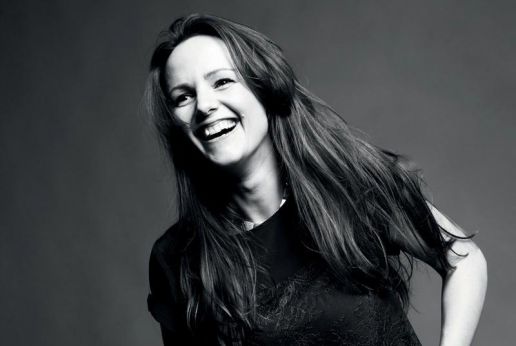
What advice would you give an individual looking to start-up a sustainable fashion retailer, particularly with the threat of a current ‘retail recession’?
Research is the first most crucial piece of advice. But the biggest obstacle you will come across is finances. Sourcing sustainable fibres and fabrics are more expensive than unsustainable options and mills will not accept small runs. You must build relationships with suppliers to be able to get the smaller quantities needed, and this takes time. I really believe there is a future in collaborating with like-minded designers to approach companies together so you can fulfil your orders when starting out.
ABIGAIL MORRIS
In your opinion, what are the top 3 things that brands should focus on with regards to promoting their sustainable practice.
1) Create a strong storytelling environment. Whether via online or offline experiences, sustainability is best shared as a story that people can easily back and tell their friends.
2) Be authentic. Nobody is perfect when it comes to sustainability. Bring people on your journey and celebrate your achievements with your community in real time.
3) Strive for increased transparency. Open up your supply chain and show people you are working to the highest ethical standards. Whether you are showing who made your clothes or using blockchain to track your supply chain, people increasingly want to know the provenance of your products.

Do you think ethical clothing will ever out-compete the mainstream less ethical products and dominate the fashion industry in the future? Why?
I don’t think new ethical clothing alone will out-compete the mainstream. However, what is more, interesting is how new business models will disrupt the fast fashion industry. ThredUp found that the second-hand market is growing 21 times faster than retail apparel over the last three years and is on track to be larger than fast fashion by 2028. At the same time, fashion rentals and sustainable fashion are moving into the mainstream. Given that fast fashion relies on volume, it will be interesting to see how and when mainstream brands will pivot towards a conscious fashion future.
Why do you think people are still buying from mainstream shops that sell unethical clothing?
People still buy unethical clothing because there is a variety with a strong product-market fit, and it is super easy to find. Sustainable fashion is making amazing strides on these areas. We increasingly see brands get product quality, price point and aesthetics right, but we need more choice and scale to compete. This has to be coupled with an easy way to find sustainable products. This is why we set up Compare Ethics – we know there are amazing sustainable products out there, it just has to be easy to find them.
OLIVIA PINNOCK
What do you see as the biggest challenge in getting customers to seek out more ethical and sustainable alternatives to high street fashion?
The biggest challenge is the convenience of mainstream fashion. It is far easier to seek out familiar brands that the consumers’ trusts, are fresh in their minds because of advertising and offers affordable fashion with next day delivery than it is to look for alternatives. Greenwashing is another issue that does damage to the whole sustainable fashion community as shoppers are not sure who they can trust.
What steps can we take to increase transparency and accountability for high street retailers?
I think governments have a tremendous amount of power in making the fashion brands that operate in their countries more transparent. We have seen it here in the UK with the Modern Slavery Act and the Environmental Audit Committee’s investigation into a fast fashion which bought CEOs from some of the biggest UK retailers into parliament to testify on what they’re doing about the issue. Companies are not going to give over information about their practices and their suppliers willingly for fear of giving valuable information to their competitors, but governments have the power to say that protecting garment workers and the environment is far more critical than that.
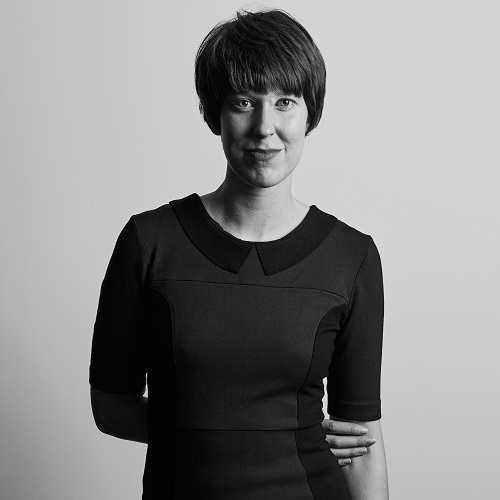
What advice would you have for people that want to be more conscious of their fashion choices?
Start with the wardrobe that you have. Consumers can make the most significant difference by changing how much they buy and how they manage their clothes at the end of their life. There are things you can do to support more ethical brands and put pressure on big brands, but where you can make an immediate, tangible impact is in your own home. Take steps to reduce how much clothing you’re buying, if it’s possible, and when you’re done with a piece of clothing, ask yourself whether it can be repaired or upcycled instead. If you still want to throw it away, can you give it to a friend to extend its life? It’s much better to give it to someone you know will wear it than take it to a charity shop where you don’t know where it will end up, especially if they can’t sell it if it’s not worth hanging on to someone, research how you can responsibly dispose of textiles in your local area through recycling schemes.
SUSTAINABLE INNOVATIONS: Interview with Simon Angel
You’re curating the Sustainable Innovations forum at Munich Fabric Start for the fourth time. Where are you looking for these new ideas and concepts?
I follow the heartbeat of current and future matters and perspectives. I am inspired by people and products which question the quality and essence of life. This leads me to the roots of the design processes, to the inner core of the industry, research institutes and universities. Textile innovations can be found in all different kinds of areas from fashion to health care, automotive as well as many other sectors. The art of thinking outside and inside the box at the same time plays a central role to find new innovations.
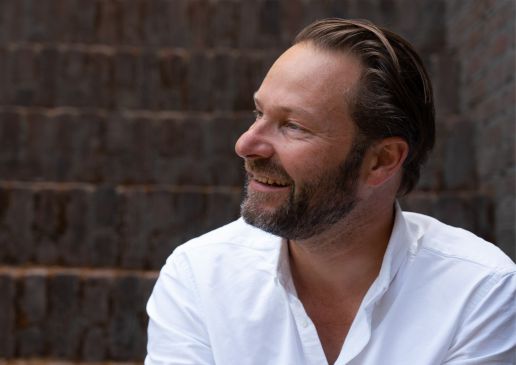
What do the showcased projects have in common?
There are two aspects which unite the Sustainable Innovations: poetry and purpose – and we most definitely need both! We need people who respond with poetry to inspire and open up new ideas and we need the hardcore problem solvers. With this edition we show several projects that provide concrete examples of what the successful interplay between poetry and problem solving can look like. Be it in 3D printing solutions or in human capital or in terms of circular solutions. Sustainable Innovations showcases great examples of what re-thinking and re-acting can lead to.
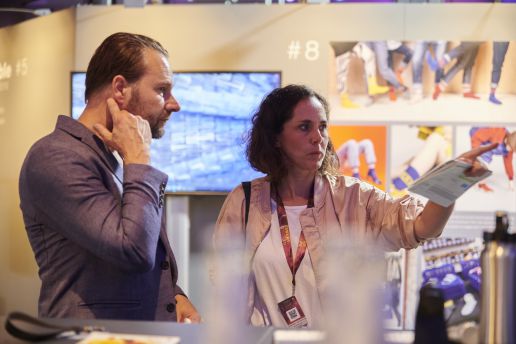
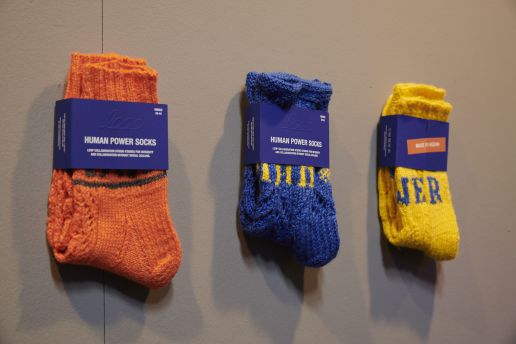
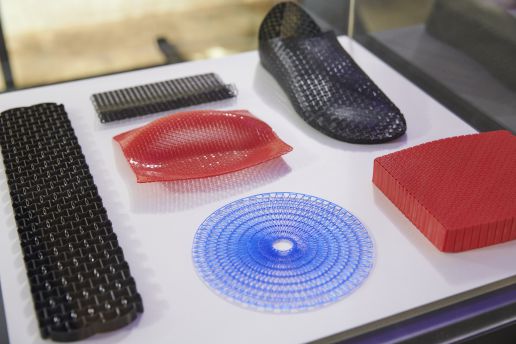
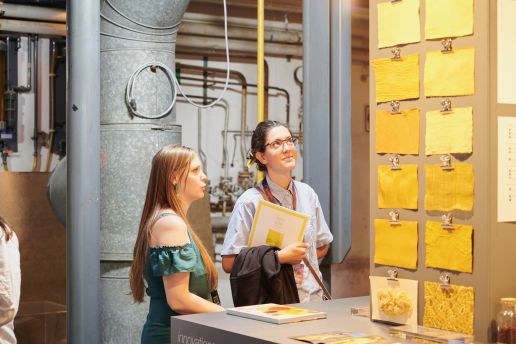
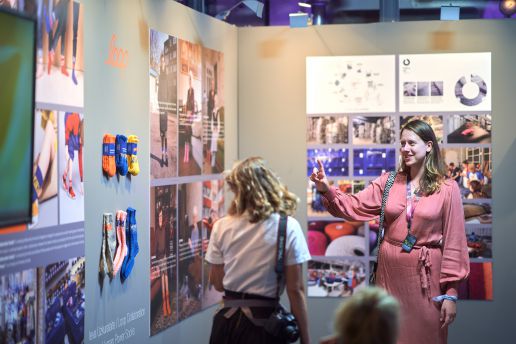
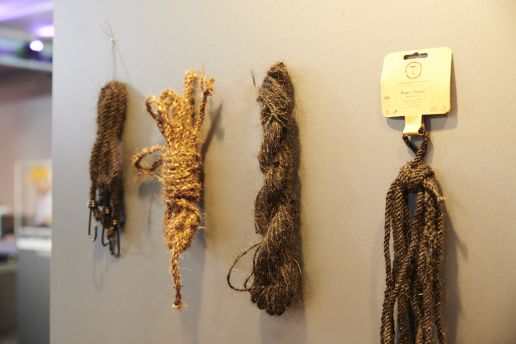
With regards to the exhibits, do you see any major trends?
I see the need for and can almost hear a desperate cry for contact. People want to develop a deeper relationship with each other but also with products and materials. The overload of information and the limitless possibilities to connect brings us to the essence of connection: purpose. The designers question their activities, relationships, products, services and business models in order to establish connections that make sense. Connections which will enable and explore new ideas, materials and directions. The power to create a new kind of connection is the next innovation: meaningful people, purposeful like poetry.

What can the industry learn from Sustainable Innovations?
Perhaps it’s not so much about learning something, but more about opening up and establishing a dialogue. The designer has their own view of the market as well as human needs and the industry has its own view and perspectives as well – but these two perspectives are not always sufficiently aligned. Therefore collaborations are key: BEyondAWARE!
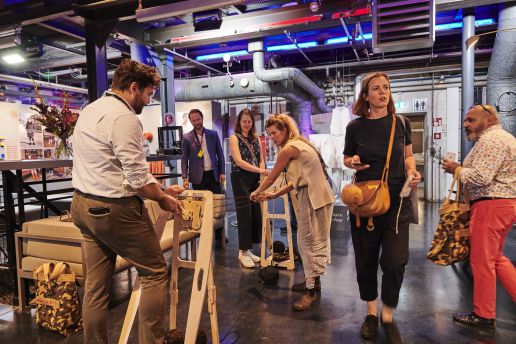
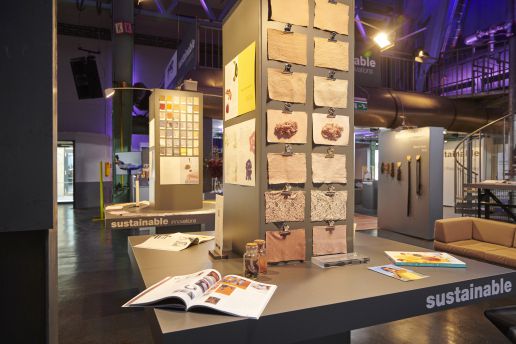
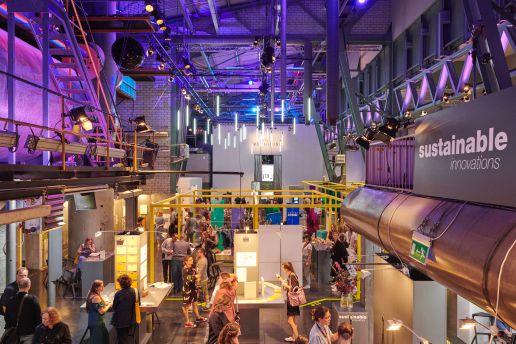
‘Sustainability is not just a trend but a MUST’

At Munich Fabric Start, we are constantly evolving and expanding our offering to meet the demands of the fashion industry. As a whole, the fashion industry is experiencing the effects from increasingly consumer led trends and habits. We are undergoing a shift from fast fashion to slower, sustainable and more responsible manufacturing, transparent supply chains as well as inherently greener brands, products and materials.
“Sustainability is more than just a trend. We are convinced that the industry will fundamentally change in the coming years from within and as a result of this topic.”
– Jo Baumgartner, Trend Researcher at Munich Fabric Start
The upcoming edition of Munich Fabric Start puts issues around sustainability at the forefront with revolutionary new formats. Here are our platforms and initiatives which are making it easier and more accessible to source sustainable at the next edition of Munich Fabric Start.
ReSource
With ReSource, Munich Fabric Start has established an advanced sourcing platform that demonstrates new dimensions of sustainability for innovative and future-oriented production processes. It has defined a forum, initiated and supported by experts that provides real solutions, provides information on the latest standards through seminars and lectures, even bringing together potential cooperation partners.
Find the complete ReSource range online to source your eco fabrics and trims 24/7. This unique platform facilitates the sourcing of responsible and clean fabrics and accessories from around the world.
Check out the full list of events happening at ReSource here.
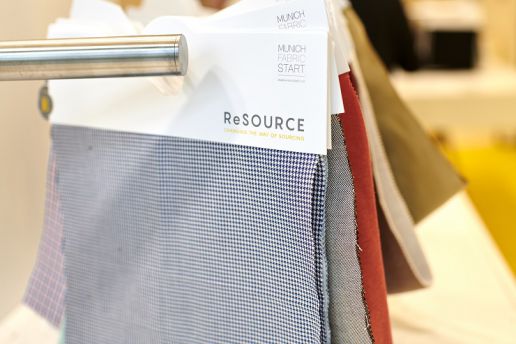
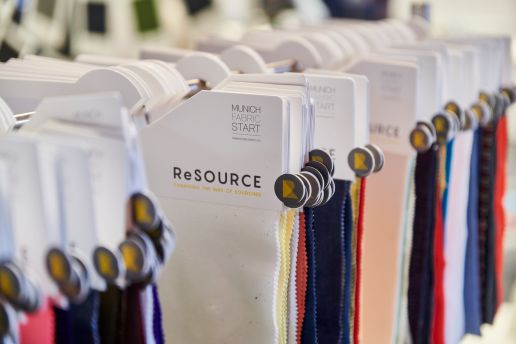
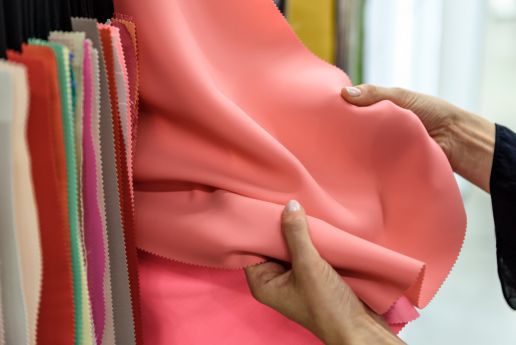
Trend Forum
In our Trend Forums we explore the theme of sustainability with “FORWARD ETHICS” the clothing brand concepts which represent the demand for transparency and caters to the more conscious and informed consumer. Fundamentally it explores the transparency in the production and supply chain, all the way from the seed used by farmers making natural dyes to production and distribution. Keynote speakers, panel discussions and round tables discussions will shed more light on this ongoing transformation as well as provide food for thought and insights into the future.
“Consumer behavior has changed a lot and with it, so too has the market. The consumer is more informed than ever before. The consumer is more conscious and critical, demanding transparency in the production and supply chain.”
– Jo Baumgartner, Trend Researcher at Munich Fabric Start
Events
The event program on offer at Munich Fabric Start is a reflection on the issues, strategies and common themes the industry as a collective are facing right now. With many of our seminars, panel discussions and keynote talks led by the theme of sustainability, we are equipping our visitors with the necessary tools and know-how to grow their brand and business successfully during these times. In particular you should be sure not to miss these two highlights:
SusTECHability – HOW TRENDS & TECHNOLOGY INFLUENCE SUSTAINABILITY IN FASHION
Lifestyle & Design. Sustainable Resources & Circular Processes. Big Data & Artificial Intelligence. Topics that were completely separate in the past influence each other and become the melting pot of the future of fashion.
Li Edelkoort | Founder and President of
the Parisian trend forecasting agency Trend Union
Michael Stanley-Jones | Co-Secretary, UN Alliance for Sustainable Fashion
– United Nations Environment Programme
Tricia Carey | Director Global Business Development Denim at Lenzing Fibers
Natasha Franck | CEO & Founder EON Group Holdings Inc.
Erik Bang | Innovation Lead H&M Foundation
Muchaneta Kapfunde | Founding Editor-in-Chief FashNerd.com
Moderation: Jana Kern & Alex Vogt | KERN. Consulting
Tuesday, 3rd September 2019 at 11.30am, KEYHOUSE Hall 5
HIDE ME

HIDE ME
RESHAPING THE FASHION INDUSTRY FOR GOOD
From slow fashion to mainstream business, materials to education, sustainability is a vast and complex issue that has raised many questions on how we can reshape the fashion industry for good.
Muchaneta Kapfunde, Founding Editor-in-Chief FashNerd.com, interviews these 4 ladies:
Charney Magri | Co-Director: Catwalk to Creation and Partner: Do Epic Good
Olivia Pinnock | Fashion Journalist, Lecturer and Founder of The Fashion Debates
Abigail Morris | Founder and CEO of Compare Ethics
Rosanne van der Meer | Founder The Girl and The Machine & N.I.O.
Wednesday, 4th September 2019 at 10.30am, KEYHOUSE Hall 5
Keyhouse
Our think tank for the fusion of fashion, innovation and technology with seminars, panels, presentations and guided tours, Keyhouse presents the latest innovations for smart textiles, sustainable developments and innovative production methods. The lecture area in Keyhouse will host a series of talks, presentations and discussions centered around the theme of sustainability.
Sustainable Innovations
Presented in Hall 5 at Keyhouse, Sustainable Innovations exists somewhere between poetry and problem solving. Showcasing inspirational applications of revolutionary innovations ranging from 3D printing, to human capital, to circular solutions.
‘With this edition we show several projects that provide concrete examples of what the successful interplay between poetry and problem solving can look like.’
– Simon Angel, Curator of Sustainable Innovations
Exhibitor Developments and Sample Areas
Samples submitted to our ReSource area will be showcased throughout the show in various convienient locations, including in the walkways of the MOC building, a selection of samples will be presented at Keyhouse to compliment the sustainable innovations area as well as dotted throughout the trend forum. Of course ReSource fabrics, labelling and additional products will be on display in the dedicated ReSource area in Hall K4.
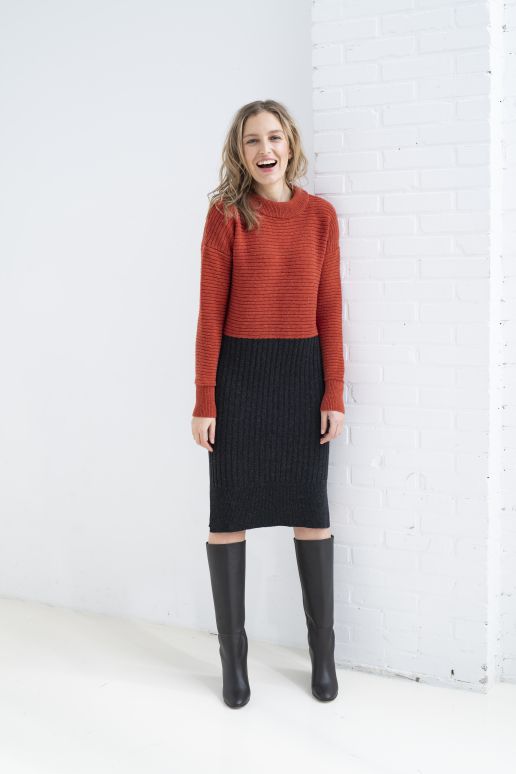
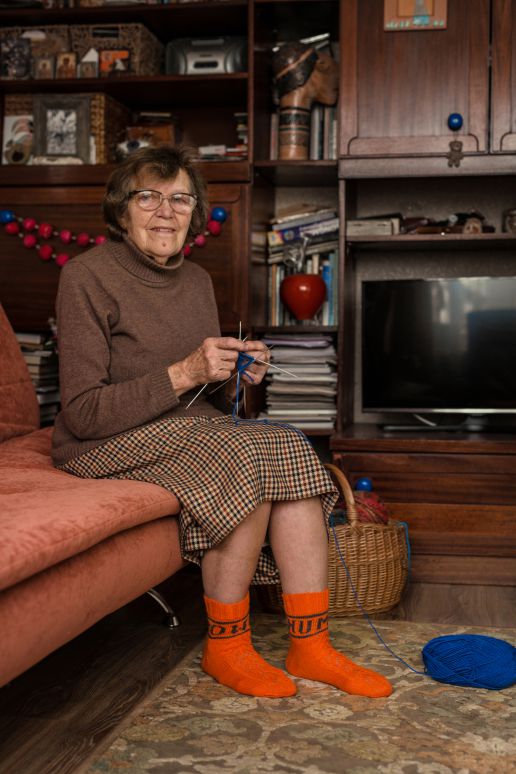
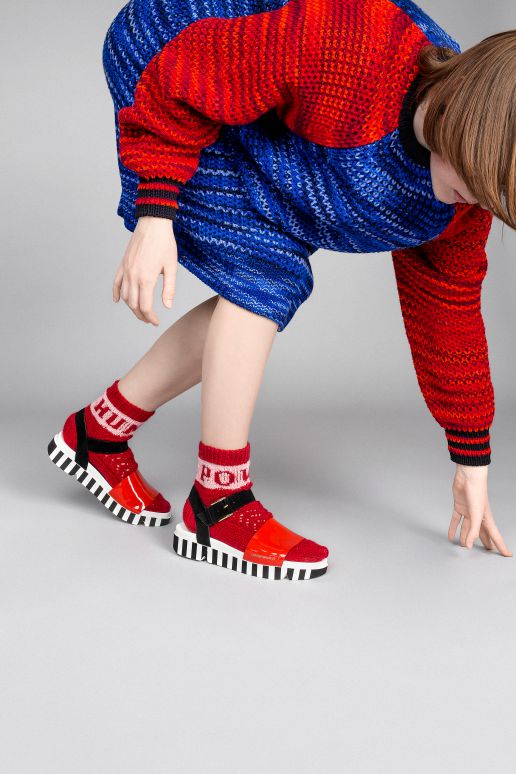
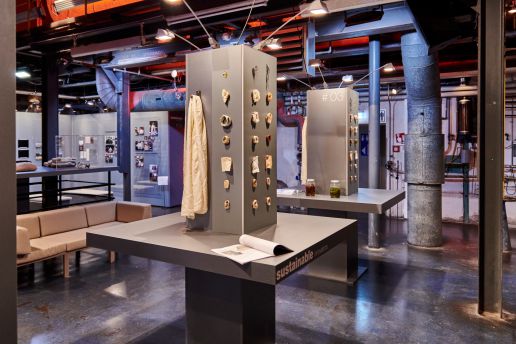
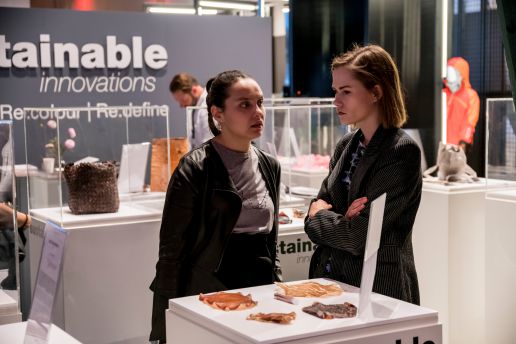
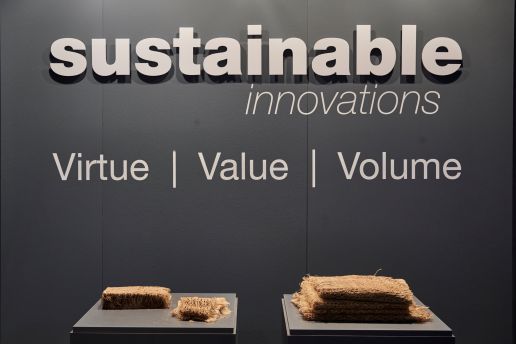
As you can see, sustainability and its related areas are broadly and comprehensively represented. MUNICH FABRIC START became committed at a very early stage and initiated strong forums which are continuously expanding.
You’re invited to attend MUNICH FABRIC START, where more than 1000 suppliers will present more than 1800 collections for Fabrics and Additionals for Autumn.Winter 20/21.
MUNICH FABRIC START: 3-5 of September 2019
Planet REhab Capsule: Celebrating Sustainable Collaboration
It is great to have organic fibres, right? But as a producer of fibres, the influence on a more sustainable textile production often stops here. Textile garments have complex supply chains which sometimes imply production partners all over the world. That’s why the solution for a more coherent and holistic form of sustainability often lies in right supply chain partnerships!
That’s the idea behind the so called “Planet Rehab” capsule collection, for which renowned textile companies, who are environmentally committed, have partnered up to create something bigger than their own.
The collection was presented during last edition of KEYHOUSE in January. MUNICH FABRIC START feels especially committed about this project as all project partners – Lenzing, Tejidos Royo, Officina +39, and Tonello have been long term exhibitors at the fair.
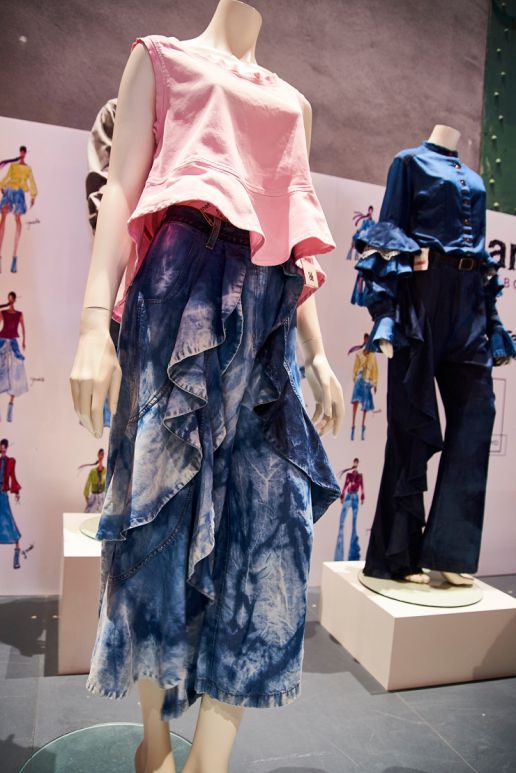
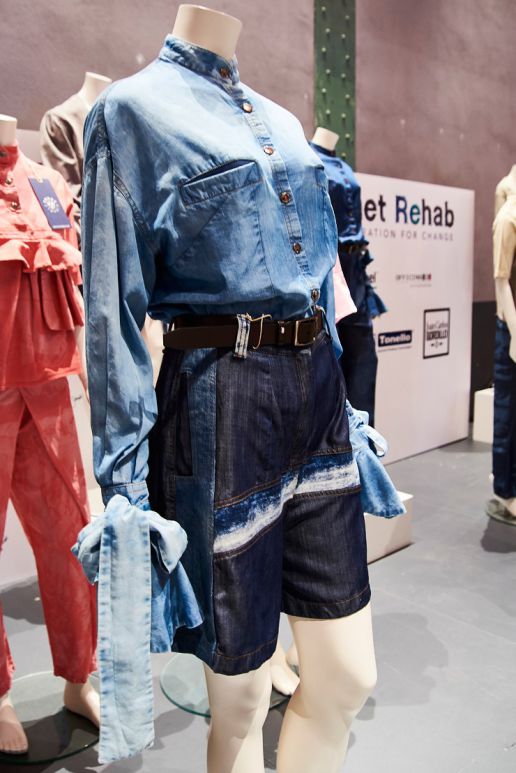
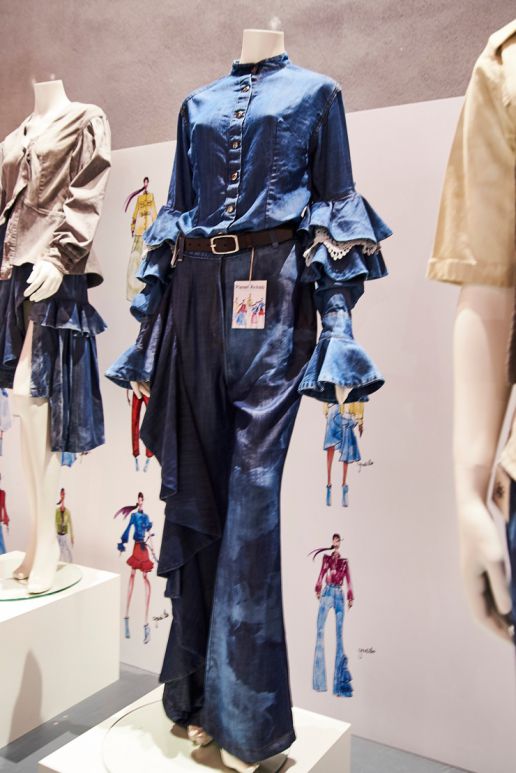
These companies recognized the success to achieving their own goals lies in fulfilling their shared ones, by working collaboratively and responsibly – seeking out more sustainable raw materials, implementing new technologies and employing processes that reduce resource utilization and waste. Juan Carlos Gordillo designed the Rehab collection around Lenzing’s TENCEL™ and TENCEL™ x REFIBRA™ branded lyocell fabrics from Tejidos Royo. The fabrics were dyed using Recycrom technology from Officina+39 and the resultant garments finished by Tonello.
Lenzing’s TENCEL™ and TENCEL™ x REFIBRA™ branded lyocell fibers enhance the sustainable qualities of the fabrics. Made from renewable wood in a closed loop, energy and resource efficient manufacturing process, TENCEL™ fibers and TENCEL™ x REFIBRA™ fibers made with recycled cotton scraps provide the fabrics with softness, smoothness, tenacity, and color intensity.
Spanish fabric producer, Tejidos Royo, creates “fabric with values” through the company’s commitment to the United Nations Sustainable Development Goals. The manufacturer’s vertical business model has substantially reduced its energy consumption and CO2 emissions through aggressive R&D and provides complete transparency and traceability for their customers
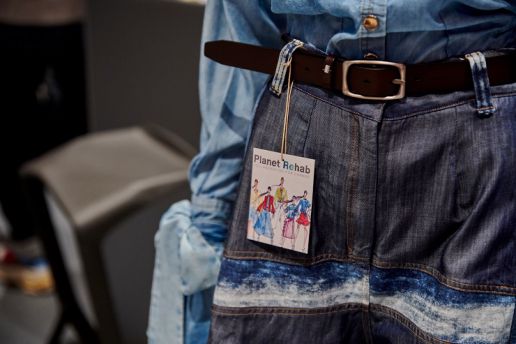
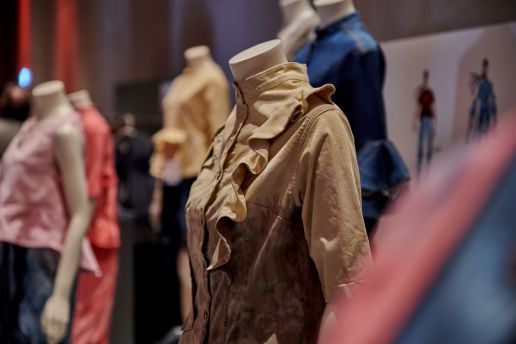
Officina+39’s Recycrom dyes are made from recycled clothing and textile scraps that are specially processed by these Italian experts through a sophisticated production process using only natural chemicals. Waste fabrics are crystalized into an incredibly fine powder that can be used as a pigment dye. Recycrom received the Hightex Award at MUNICH FABRIC START for Autumn/Winter 17/18.
Laundry specialist Tonello also based in Italy, contributed their ECOFREE 2 technology to the project. Fulfilling the needs of the designers and their customers, Tonello’s revolutionary washing process significantly reduces the water and hazardous chemical consumption typically associated with denim finishing.
Guatemalan designer, Juan Carlos Gordillo, applauds the Planet REhab objectives and used the member companies’ products to create fifteen women’s outfits that celebrate life and nature with exceptional color flair and a decidedly Latin influence. The full collection was displayed during the last edition of KEYHOUSE in January 2019, showcasing the eclectic and artistic style for which Gordillo is known for.
“Planet REhab is my tribute to the ocean with its deep colors and flowing shapes,” the celebrated designer says. “The collection also protects the ocean because it is created from the sustainable fibers, fabrics, dyes, and finishing techniques perfected by the Planet REhab collaborating companies. While many companies talk about being sustainable, these companies had the courage to actually create sustainable products and processes that benefit the industry, society, and the planet. I hope this collection can inspire other designers to prioritize sustainability in their creative processes.”
